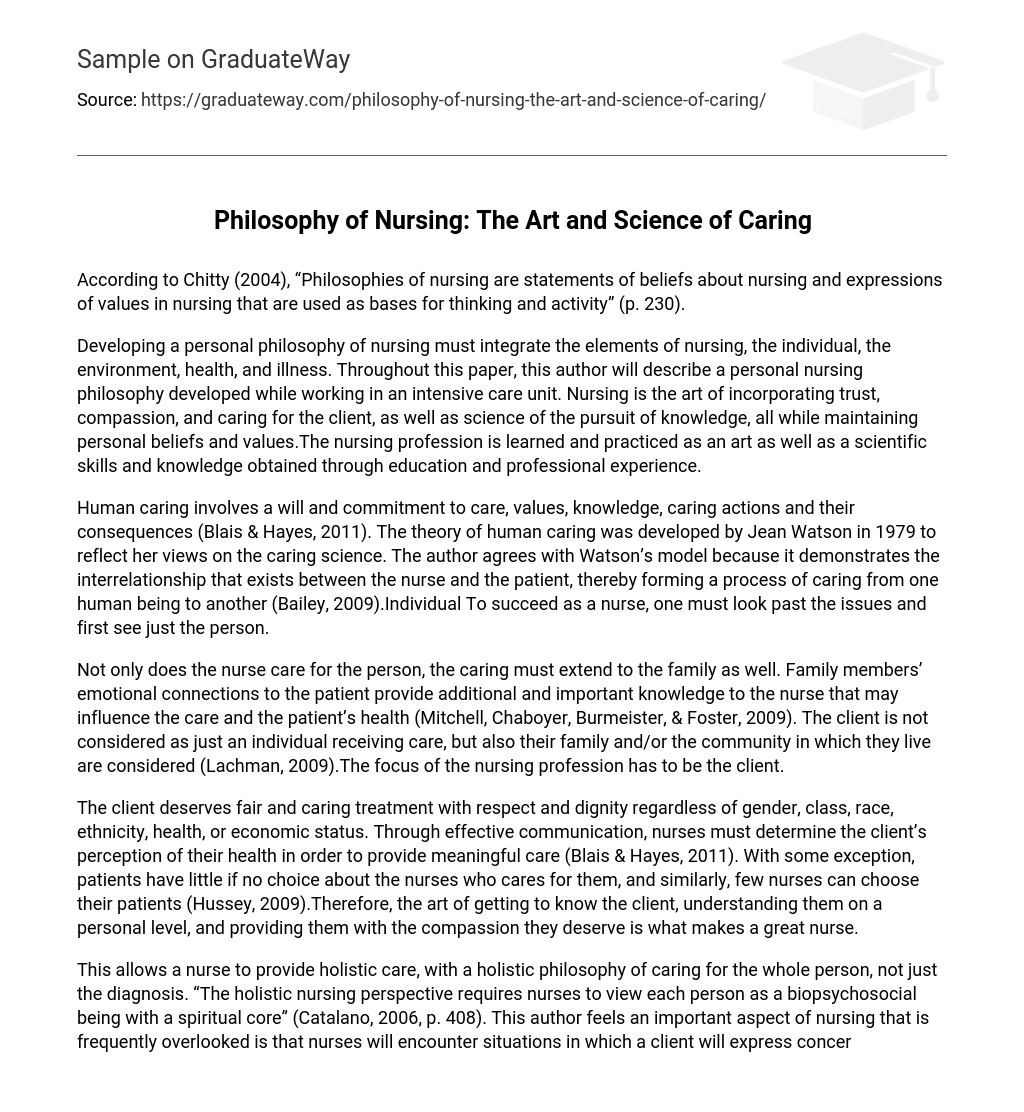Chitty (2004) defines nursing philosophies as statements of beliefs and expressions of values that form the foundation for thinking and actions in the field of nursing (p. 230).
During their time in an intensive care unit, the author of this text cultivated a unique nursing philosophy that encompasses several crucial aspects: nursing itself, the individual, the environment, health, and illness. Nursing is recognized as both an art form and a scientific discipline which fuses trust, compassion, and caring with the continuous pursuit of knowledge. This profession demands not only education but also professional experience to attain the essential skills and knowledge.
Human caring encompasses the will and dedication to care, values, understanding, caring actions, and their outcomes (Blais & Hayes, 2011). Created in 1979 by Jean Watson, the theory of human caring reflects her perspective on the science of caring. The author supports Watson’s model as it illustrates the interconnection between nurses and patients, fostering a caring process between individuals (Bailey, 2009). To excel in nursing, it is crucial to prioritize seeing the person beyond any existing problems.
In addition to caring for individual patients, nurses also have a responsibility towards their family members. The emotional bonds between the patient and their family offer valuable information to the nurse, which can affect the care provided and ultimately influence the patient’s overall well-being (Mitchell, Chaboyer, Burmeister, & Foster, 2009). Furthermore, nurses not only address the needs of the individual receiving care but also take into account the welfare of their families and communities (Lachman, 2009). Thus, it is essential for nursing professionals to prioritize serving clients.
Treating clients with fairness and care is essential, regardless of their gender, class, race, ethnicity, health, or economic status. It is crucial to show respect and dignity towards the client. Effective communication skills are necessary for nurses to understand how the client perceives their health so that they can provide meaningful care (Blais & Hayes, 2011). In most cases, patients have little control over which nurses take care of them and few nurses can choose their patients (Hussey, 2009). Therefore, being able to establish a personal connection with the client and demonstrating compassion distinguishes exceptional nurses.
The holistic nursing perspective enables nurses to offer comprehensive care, based on the philosophy of addressing the entire individual rather than just their diagnosis. According to Catalano (2006, p. 408), holistic nursing requires nurses to perceive each person as a biopsychosocial being with a spiritual essence. The author emphasizes the often neglected aspect of spirituality in nursing, noting that nurses will regularly encounter clients expressing spiritual concerns.
To effectively address this issue and seek assistance, nurses must acknowledge its significance and possess the necessary abilities and empathy to handle these challenging subjects (Hussey, 2009). In addition to attending to the client’s physical, social, and psychological well-being, nurses inevitably require the skills to address their spiritual health. The healthcare environment encompasses both external and internal factors. According to Watson, “A nurturing environment fosters personal growth while empowering individuals to make optimal decisions for themselves” (Blais & Hayes, 2011, p.
Depending on the situation, a nurse must create a therapeutic environment that fosters either the healing process or the process of dying. Clients are both influenced by and have an influence on their environments. When teaching is offered to clients, it provides significant value and service.
A skilled nurse understands that every moment is an opportunity for teaching. By utilizing their knowledge, nurses can empower themselves to change their client’s viewpoints, apply critical thinking, and communicate the rationale behind their decisions, actions, and goals (Kenney, 2002). The concepts of health and illness are subjective. The author has noticed that someone with a tumor may feel well, while someone without any disease or sickness may feel unwell.
The nurse’s role is to acknowledge that health and illness are unique to each individual, defined by the client themselves. It is commonly believed that health and illness exist on opposite ends of a health continuum, which spans from optimal wellness to death. The continuum is influenced by six dimensions identified by the client, impacting their progress along this spectrum (Blais & Hayes, 2011). When a client is unwell, they are at their most vulnerable, and the nurse must understand this and emphasize the significance of establishing trust with the client.
The client and nurse’s initial contact often occurs in a state of unfamiliarity, lacking the usual everyday cues that build trust (Sellman, 2007). Nursing can be described in various manners, such as a profession that utilizes knowledge and care to benefit individuals, whether they are ill or healthy. According to Van der Cingel (2009), nursing is a socially accepted role that endeavors to improve the well-being and health of others.
Being a nursing professional entails a lifelong journey of learning. Nurses fulfill numerous roles such as caregivers, advocates, educators, supporters, and listeners. Personally, the author holds a deep passion for nursing. Nursing is seamlessly intertwined with every aspect of life, from embracing new beginnings to assisting during life’s final stages.
According to Blais & Hayes (2011), nursing embodies altruism, which is the selfless concern and devotion to the well-being of others. Thus, it is essential for nurses to establish their nursing practice on a personal philosophy. As they gain experience and grow personally, this philosophy may evolve. However, regardless of changes, nurses should maintain their trustworthiness, compassion, care, and knowledge to effectively serve others.
Florence Nightingale, in 1860, declared and holds true till today that “Good nursing involves merely observing the small details that are common among all sick individuals, as well as those unique to each individual patient” (p. 160).





